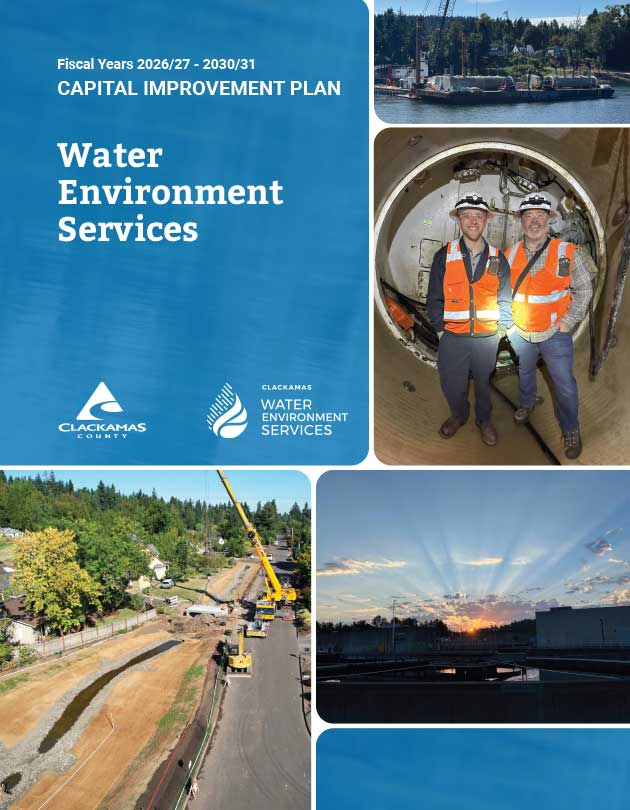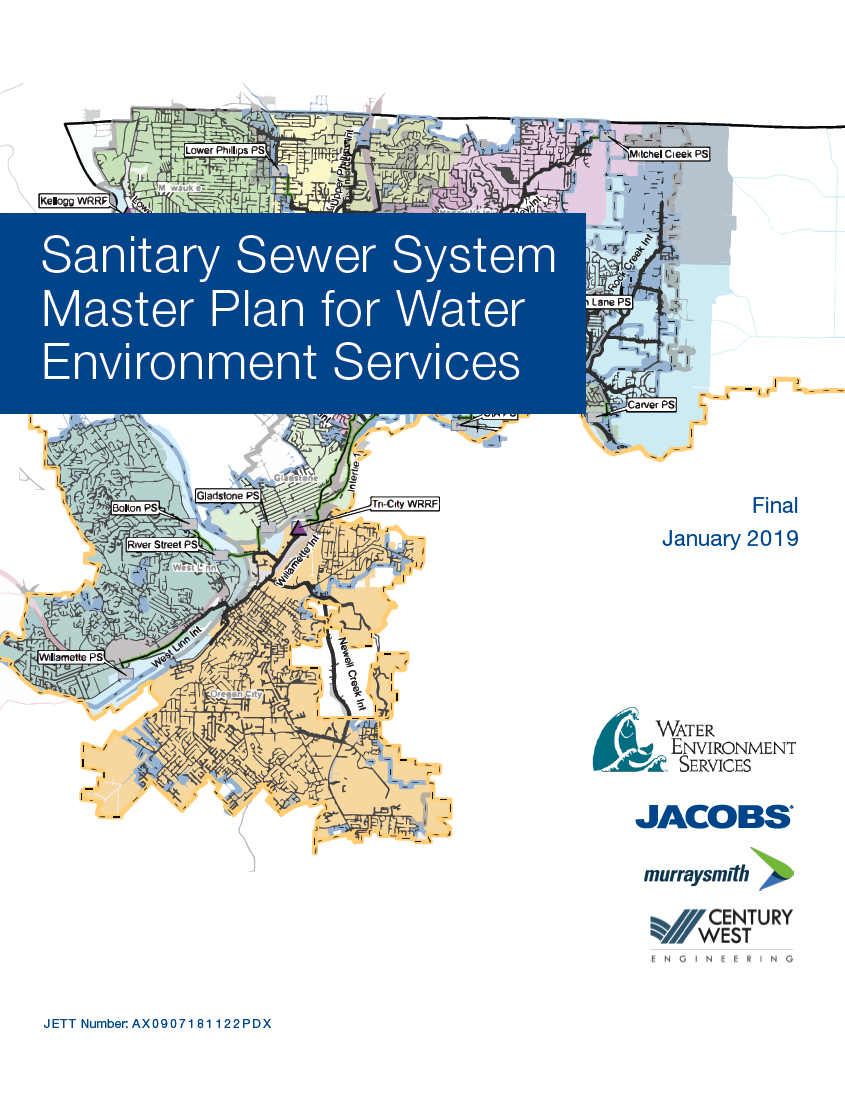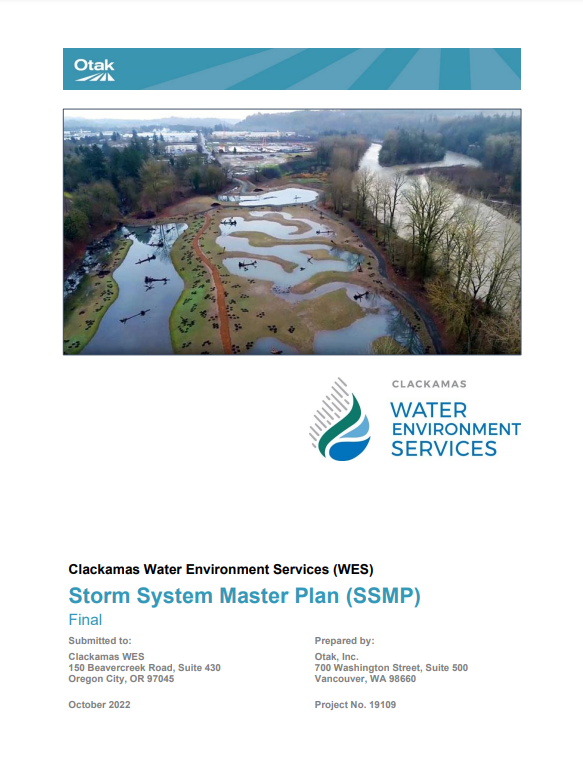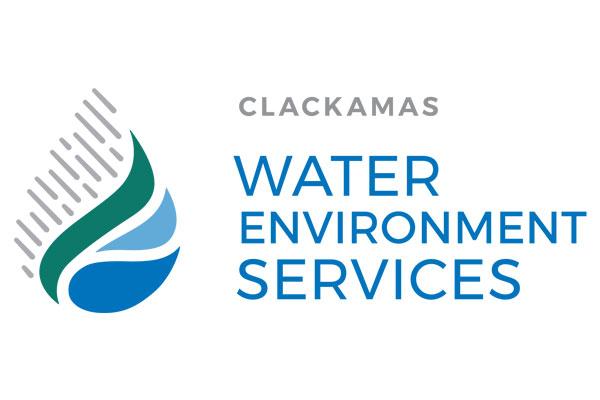Capital Improvement Program
 The Capital Improvement Group plans, designs and builds major capital facilities in the areas WES serves, so that operating divisions can serve our customers' wastewater and surface water needs. Capital project management includes design and construction and provides project controls in terms of cost, schedule, scope, program development and long range forecasting.
The Capital Improvement Group plans, designs and builds major capital facilities in the areas WES serves, so that operating divisions can serve our customers' wastewater and surface water needs. Capital project management includes design and construction and provides project controls in terms of cost, schedule, scope, program development and long range forecasting.
The Fiscal Year 2026 – 2031 Capital Improvement Plan (CIP) was developed to support WES in meeting the needs identified in our planning documents. The CIP puts forward a prioritized plan to maintain existing facilities, allow efficient, cost-effective operations and provide new infrastructure to protect human health and clean water, today.
Sanitary Sewer System Master Plan
 The purpose of this Sanitary Sewer System Master Plan is to identify immediate needs in the sanitary sewer system and develop a corresponding set of capital improvement opportunities that WES can implement through the year 2040. The Master Plan was developed to provide a least-cost combination of conveyance and treatment improvements that provide maximum value across the system.
The purpose of this Sanitary Sewer System Master Plan is to identify immediate needs in the sanitary sewer system and develop a corresponding set of capital improvement opportunities that WES can implement through the year 2040. The Master Plan was developed to provide a least-cost combination of conveyance and treatment improvements that provide maximum value across the system.
Sanitary Sewer Projects
The Clackamas Interceptor (An interceptor is a gravity sewer that transmits large volumes of wastewater to a wastewater treatment facility) lacks capacity to serve current and future ratepayers and needs rehabilitation in some areas. Design is underway. Construction will be phased over the next decade in three or four phases.
WES owns and operates the sewer system that carries wastewater from homes and businesses in Happy Valley and nearby areas to our treatment facilities. To ensure we can continue providing safe and reliable sewer service in the future, we need to make improvements and upgrades to the Intertie 2 Pump Station and increase the size of the force main.
After 50 years of service to the community, it’s time for much-needed upgrades. Construction is scheduled to begin on the existing administration building in the summer of 2026, with an estimated duration of 18 months.
Several pump stations need rehabilitation and a variety of upgrades to improve reliability including safety, structural, mechanical, electrical and control system improvements.
Inflow and Infiltration (I/I) is groundwater and/or rainwater that enters the sewer system through direct connections such as roof drains or area drains or defects such as leaking joints or manholes. When the amount of I/I becomes excessive, it is more cost effective to remove the I/I than upsize infrastructure or treatment facilities. To help achieve this reduction, WES has Intergovernmental Agreements with five partner cities. With the IGAs, WES will provide 33% funding for approved I/I reduction projects.
The Rock Creek Interceptor Extension Project was identified as a priority to ensure a safe, resilient, reliable sanitary sewer system with the capacity to serve our community now and in the future. This project will provide additional capacity and system improvements to serve Clackamas County and portions of the Happy Valley, Pleasant Valley, and the area around it.
Sewage from Oregon City, West Linn and Gladstone arrives to the Tri-City Water Resource Recovery Facility (WRRF) through a large pipe approximately 40 feet underground. In order to treat the incoming flow through the facility, the Influent Pump Station (IPS) pumps the flow up to ground level for subsequent flow through the treatment process. An upgrade is needed to both expand the capacity of the facility and replace obsolete equipment.
The capacity of the existing Tri‐City outfall is approximately 75 MGD and is expected to be exceeded as flows increase as projected. The capacity of the new outfall will be higher, provide improved mixing over the existing outfall and have sufficient capacity for decades to come.
The existing Willamette Pump Station and Force Main, which were constructed 1986, have served the West Linn community well. However, improvements and upsizing are needed for WES to continue to provide a resilient, reliable sanitary sewer system to serve our community now and in the future.
Past Projects
Storm System Master Plan
 The Storm System Master Plan (SSMP) provides a flexible framework for storm system infrastructure operations, maintenance, and expansion to improve the quality of surface water. The Known Issues Atlas maps the locations of identified stormwater system issues, such as water quality, flooding, erosion, and maintenance problems.
The Storm System Master Plan (SSMP) provides a flexible framework for storm system infrastructure operations, maintenance, and expansion to improve the quality of surface water. The Known Issues Atlas maps the locations of identified stormwater system issues, such as water quality, flooding, erosion, and maintenance problems.
Surface Water Projects
WES owns the 3-Creeks Protected Area, where Mt. Scott, Phillips and Deer (Dean) Creeks come together on 89 acres in Northern Clackamas County. WES is working on the final plans to enhance floodplain processes and the existing natural floodplain area, construct wetlands and floodplain terraces to increase flood storage, improve fish and wildlife habitat, restore wetlands, and restore natural floodplain function.
WES constructed the Carli Creek regional water quality facility to remove pollutants in runoff from developed industrial lands in the Clackamas Industrial Area. The project redirected urban runoff through a newly constructed treatment wetland to reduce negative impacts of high storm flows and pollutants. Ongoing work may include irrigation, weed management, removing/managing sediment, managing water flow, vegetation monitoring and statistical analyses.
Detention Pond Repair/Rehab
Detention pond repair/rehab includes removing silt and overgrown vegetation from detention ponds to return the ponds to their original design. Since the original installation, many ponds have become overgrown with vegetation. The pond bottoms are filled with vegetation and silt making them ineffective for stormwater treatment.
Drainage System Modifications
Stormwater System Repairs and Upgrades
Projects include small drainage and retrofit projects that restore or enhance the functional capacity of the storm system. Projects may include work to improve drainage issues, installing small low-impact development facilities such as rain gardens as retrofits, and repairs to infrastructure such as previously installed restoration projects.
The purpose of this project is to reduce flooding and improve habitat along Kellogg Creek between SE Clackamas Road and SE Thiessen Road by removing or replacing culverts and stream crossings and naturalizing a concrete channel. The project includes SE Clackamas Road Drainage Infrastructure, Aldercrest Culvert Replacement & Kellogg Creek Restoration, and Thiessen Culvert Replacement & Kellogg Creek Restoration.
 Translate
Translate






